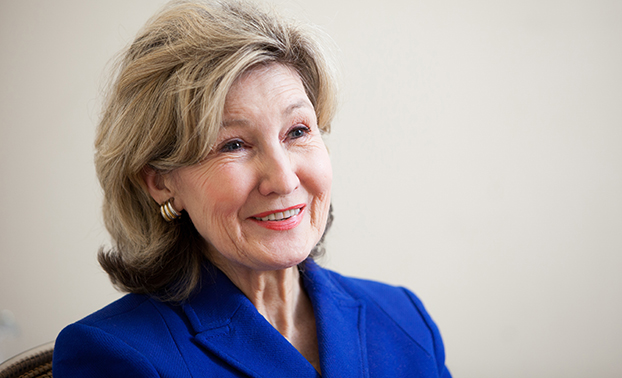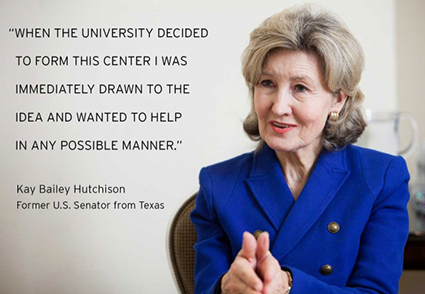
UT Energy Week concluded with an inaugural symposium and gala hosted by the Kay Bailey Hutchison Center for Energy, Law and Business, a newly formed collaboration combining the resources and missions of energy initiatives from The University of Texas School of Law and the McCombs School of Business.
Named for former U.S. Sen. Kay Bailey Hutchison of Texas, the KBH Center will sponsor research, host lectures and conferences, and develop innovative curriculum and learning opportunities leading to energy careers.
Sen. Hutchison was in Austin this month to speak at a public finance conference, and the McCombs School of Business sat down to ask her about the new center and her interest in driving energy innovation at The University of Texas at Austin.
All of human society is influenced by energy access and sustainability. What do you wish the university’s role to be in shaping the future of energy?
Well, first of all, energy has been a mainstay in the building of Texas. We have vast resources, and fortunately for us our founding fathers decided to dedicate and protect public lands to support our two universities — our flagship, The University of Texas at Austin and Texas A&M. That has been the foundation for Texas’s economic success.
The university is breaking new ground in energy leadership, and it’s clear that we should have a center for energy in business and law. We are the flagship university with innovative energy research and energy specific curriculum, and you would expect all of these offerings to be at The University of Texas.
I am very excited about it, and I think that we have an opportunity to be the place where anyone who wants to know how to manage energy production or manage an energy company will know they need to go to The University of Texas.
How did your involvement in the Kay Bailey Hutchison Center for Energy, Law, and Business come about?
I had been very active in the energy field in my 20 years in the Senate. I came to know the energy industry, and I was very active in assuring that our energy industry got the same treatment as other manufacturing industry components.
I’ve had to fight when people didn’t understand the importance of the industry. Big Oil is a producer, a job creator, an essential part of our economy, and I wanted to make sure they were treated the same as other industries. I got into the weeds a lot trying to make sure that we were doing everything we could to make this a viable business.
So when the university decided to form this center I was immediately drawn to the idea and wanted to help in any possible manner.
I’m going to give John Beckworth, associate dean at the law school, great credit for coming up with the idea of a consolidation putting McCombs, the law school and Cockrell School of Engineering into a situation where they can collaborate and be stronger by bringing these disciplines together.
The deans have been very involved in the formation of the center, and we have two wonderful co-chairs, Duke Ligon from the law side and Sam Susser from business. I will provide counsel and do whatever I can to be helpful, and I’ve tried to help bring in a strong board. We have a great advisory board and I think we’re going to bring in a lot more of people who will see and love what we’re doing.
 What new capacity will the center add at the university?
What new capacity will the center add at the university?
The first opportunity will be to further encourage and support research that is truly cross-disciplinary, bringing together the best thinking in law, public policy, business, and engineering. So academic research is a big priority.
I’m also excited by the early discussions of establishing a master’s degree in energy management that will give graduates who want to go into the energy business a truly balanced set of skills and knowledge. That’s in the very infant stages.
We have a symposium this week that is going to have the former ambassador from the United States to Saudi Arabia Robert Jordan and former Sen. Mel Martinez who served with me in the Senate. He is now the chairman of JPMorgan Chase & Co., Latin America.
We have Mexican officials, U.S. State Department officials, industry professionals and researchers, and we’re going to talk about the opportunities focusing on Latin America and Mexico, but also we will discuss the Saudi Arabia issue because of what’s happening right now.
The university seems ideally qualified to host these international energy discussions. Do you agree?
Absolutely. Texas shares a 1,200-mile border with Mexico. For the same reason we should be the center for energy, we should be the center for Latin American studies as well. We have the most outstanding Latin American and Mexican studies already.
We already have a joint degree program with ITAM, the Mexican law school, that allows someone to go to law school for the fourth year and get a dual degree from The University of Texas at Austin and the ITAM Law School in Mexico. That’s just one example of how we are perfectly situated to be the leader in Latin American and Mexican energy studies on both the business and law sides.
What do you hope the business faculty and students will bring to the table in this new collaboration?
Already, anybody who wants to go into the energy business is going to say, “I want to go the McCombs School of Business.” This just adds to that appeal. It will create research opportunities and build academic leadership in energy studies in business.
Dean Tom Gilligan was very creative in saying, “This is where we ought to go,” because the opportunities now in Latin America, combined with our research and teaching strengths at the university, have created the best of all worlds.
I don’t think anybody would question that we have the strongest energy reputation in the business school as well as the law school. Our professors have written the textbooks on the subject. So it’s a wonderful synergism between McCombs and Texas Law, with the added component that energy and Latin America are so crucial in today’s world.
Talk a bit about the audiences you hope will be drawn into this discussion.
I want to attract lawyers and business people who want to have context from both sides, to get to know who else is in the field so they know whom to call when they have questions or want to hire the right people. I want it to be a center where people make contacts and learn the newest information out there.
You are also involved in the university as the president of Texas Exes. What was your motivation for stepping into that role?
I was totally surprised when I was asked to become the president. I had just retired from the Senate and they asked if I would be president-elect. So I thought, if I can help I want to, and I thought it was an important time, not necessarily an easy time but an important time to be able to come in and hopefully make a difference.
I think we’ve gotten through the hardest part now and I’m very optimistic. We have a wonderful new chancellor and we have a new president in the offing. I was privileged to be on the search committee and I was very impressed with the candidates from whom we had to choose.
So I think we’re on the upswing and Gov. Abbott has made it very clear that he wants the very best for our university and he has appointed regents who are loyal and well-regarded, and are graduates of our university. We’re in a position now to move away from any conflict and all pull in the same direction.
Thank you for carving out time from your busy schedule to speak with us today.
I appreciate the opportunity, because I will do anything possible to put the energy center in the limelight and push forward with the university.
Besides her work with the KBH Center for Energy, Business and Law, and her role as president of the Texas Exes, Hutchison is also a member of the UT Law School Foundation Board of Trustees, the UT Southwestern Medical Foundation Board of Trustees and the MD Anderson Advisory Board. She was named a Distinguished Alumna in 1995.
